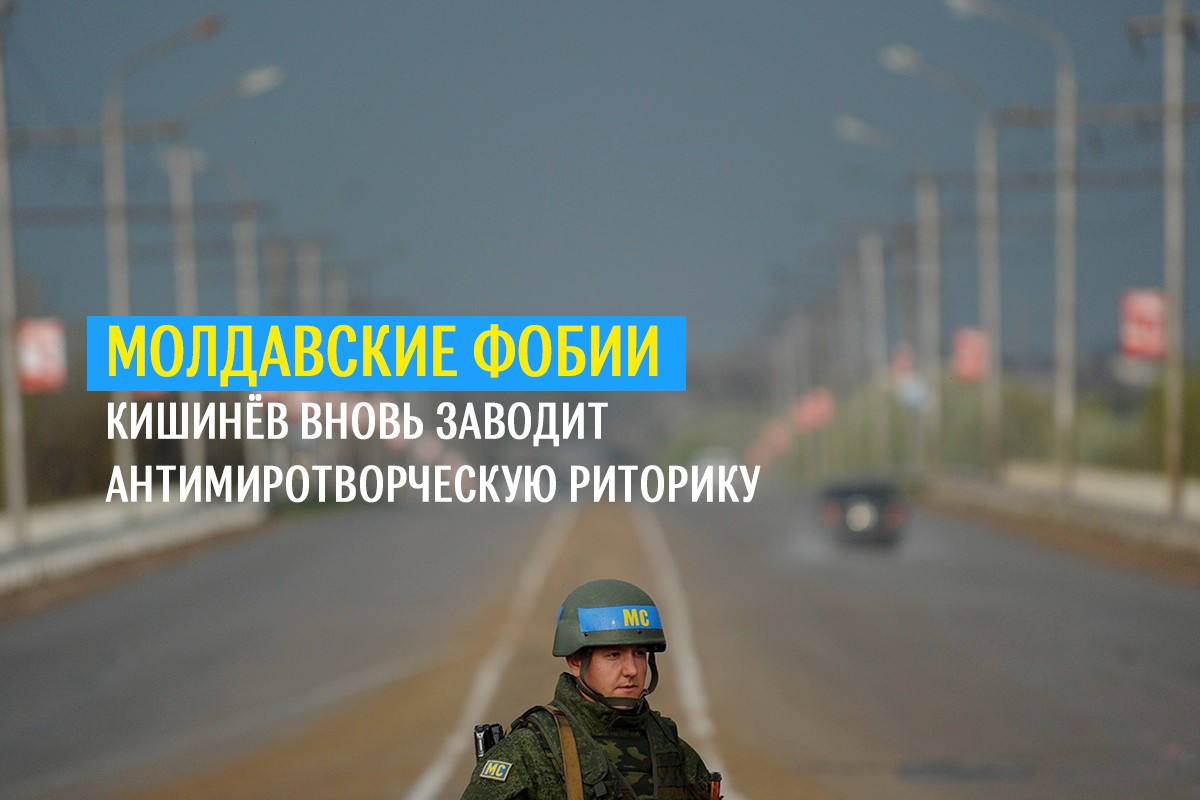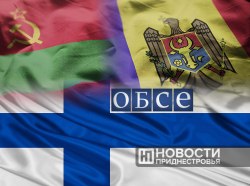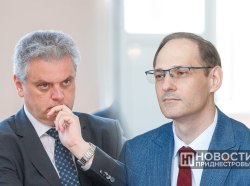The presence of Russian peacekeepers in Pridnestrovie continues to bother Moldovan politicians. The recent statements by the Moldovan prime minister in Kiev and the parliament speaker in Washington once again testify to the spring exasperation of anti-Russian hysteria, which particularly progressed last year. Read more >>>
The apogee was Moldova's appeal to the United Nations to include the issue of the withdrawal of Russian peacekeepers from Pridnestrovie to the agenda of the 72nd session of the General Assembly. In their message, Chisinau's representatives claimed that the presence of Russian servicemen "poses a threat to the maintenance of international peace and security."
Then Moldova withdrew the draft resolution, stating the need for additional consultations. According to the Moldovan authorities, this was done because of Russia, which "resorted to some technical procedural actions to block the resolution."
Since that moment, the desire to "reach out" to the UN on this issue has become persistent. This is confirmed by the results of the recent political voyage of Filip and Candu to Ukraine and the United States.
Last week, first the Ukrainian and then the Moldovan media disseminated the statement of the Moldovan prime minister, Pavel Filip, which he made during the Kiev Security Forum, "about the possibility of holding talks with the Ukrainian authorities on the withdrawal of Russian troops from Pridnestrovie through the corridor on the territory of Ukraine."
Filip noted that Moldova "constantly demands the withdrawal of Russian troops from the territory of Moldova" and does everything possible for this. For example, it does not allow the rotation of Russian servicemen, who are sent to Pridnestrovie.
He also recalled the appeal to the UN General Assembly, expressing the hope that Moldova would still be able to "raise the issue of the withdrawal of Russian troops from the territory of the country." At the same time, the Moldovan prime minister stressed that it was "not peacekeepers, but the Russian group of troops" that were stationed in Pridnestrovie, and talks that the Moldovan authorities "are demanding the withdrawal of peacekeeping forces," were untrue; it was rather an attempt to confuse the world community.
Parliament speaker Andrian Candu, who has just returned from the US, also spoke about the possibility of another attempt to appeal to the UN. He said that "the issue of the withdrawal of Russian troops from Pridnestrovie" had been discussed in New York, and also shared his hopes that the UN General Assembly would consider the withdrawal of Russian troops from Pridnestrovie in June.
According to the Moldovan politician, last September Russia resorted to technical measures to block the discussion of this issue. But this time things will be different, and Moldova has even allegedly enlisted the support for the adoption of the relevant resolution from representatives of the United States, Germany and other countries.
As well as Filip, Kandu also stressed that "it was about the withdrawal of the Russian military contingent, not Russian peacekeepers from the security zone on the Dniester."
There is an unintentional feeling that the phrase "Russian peacekeeping forces" causes phobias in some politicians of our neighbouring country. And obviously, this is the fear of the truth. After all, it was the Russian peacekeeping forces (and no one else, ed.) that stopped the military aggression of Moldova against Pridnestrovie in 1992 and that has been keeping peace on our land for 25 years.
And the word "peacekeeper" speaks for itself, whereas "Russian troops", "foreign troops" sound militarised. Under this cover, Chisinau aspires to "sell" its anti-Russian plans and resolutions to the uninformed or ill-informed part of the international community.
Expert opinion
Russian political scientist Alexander Gushchin is convinced that all the statements and plans of Chisinau have nothing to do with reality. According to him, peacemaking is the most important political asset of post-Soviet Russia, and Pridnestrovie is a unique example of how a peacekeeping mission with the participation of the Russian Federation can efficiently carry out its functions.
"The withdrawal of Russian peacekeepers from Pridnestrovie has been discussed by Moldova since the Istanbul agreement, and it is understandable that from Chisinau's point of view the withdrawal of these forces would be an ideal scenario. But there is an agreement of 1992 clearly stating that the withdrawal is connected with the final settlement of the Moldo-Pridnestrovian conflict. It is clear that Russia will not agree to withdraw its forces until the outlines of a political settlement are groped," stressed Alexander Gushchin.
According to the expert, the fact that Moldova has chosen the Kiev Security Forum for its statements on the withdrawal of Russian military from Pridnestrovie has a very obvious explanation. Ukraine, despite being a guarantor and mediator in the negotiation process between Tiraspol and Chisinau, in recent years has only increased its pressure on Pridnestrovie, especially on its economy.
"The Kiev conference coincided with a sharp aggravation of the situation as a whole in the world. With what happened in Syria; with what is happening in relations between Russia and Britain and with other European countries. Many of the statements of the Ukrainian side on the regional agenda related to Georgia, Moldova, and the Black Sea region are related to the fact that Ukraine is trying to play the role of an accumulator of anti-Russian forces and demonstrate to the West that it is an effective outpost in this regard," said Guschin.
Since in Kiev itself, Moldova's appeals to open corridors for the withdrawal of Russian troops through the territory of Ukraine were called Utopian (many factors support this), then, most likely, the initial statement was made for the statement's sake.
According to Alexander Gushchin, peacekeeping will be the key subject on the agenda of the forthcoming meeting of the presidents of Pridnestrovie and Moldova, scheduled for 25 April.
"In addition to the peacekeeping issues and the work of the Joint Control Commission, they are very likely to discuss issues of the economy, electric power. General issues related to Moldova's internal political agenda can also be raised, as well as the formatting of the Moldovan position regarding the future process with Pridnestrovie. Because Igor Dodon's position is rather chaotic. It is impossible to keep track of what he will say. Now all his efforts are aimed to show Moscow that it is necessary to maintain him, and the famous statement is reiterated that in order not to lose Moldova, it is necessary to put pressure on Pridnestrovie and to make some concessions. But for Moscow the main line is to support Pridnestrovie, Gushchin pointed out, adding that "any games related to concessions will only lead to further pressure on Russia, given that the issue does not lie only in Pridnestrovie, but also in Ukraine and in other issues of relations between Russia and the West."
The Russian political scientist believes that now Moldova is plunged into pre-election processes, and there is nothing to expect until November, except for propaganda and information threats and campaigns.
"To a large extent, the Moldovan government is an air seller. Despite the fact that in the late autumn of 2017 there was a significant breakthrough in the negotiation process, now the main thing is the pre-election factor. No common vision of the Moldovan side, given the internal political complex situation that exists there, will be presented. There will be no real proposals and projects on their part," concluded Alexander Gushchin.
Policy analyst Irina Jordanova








